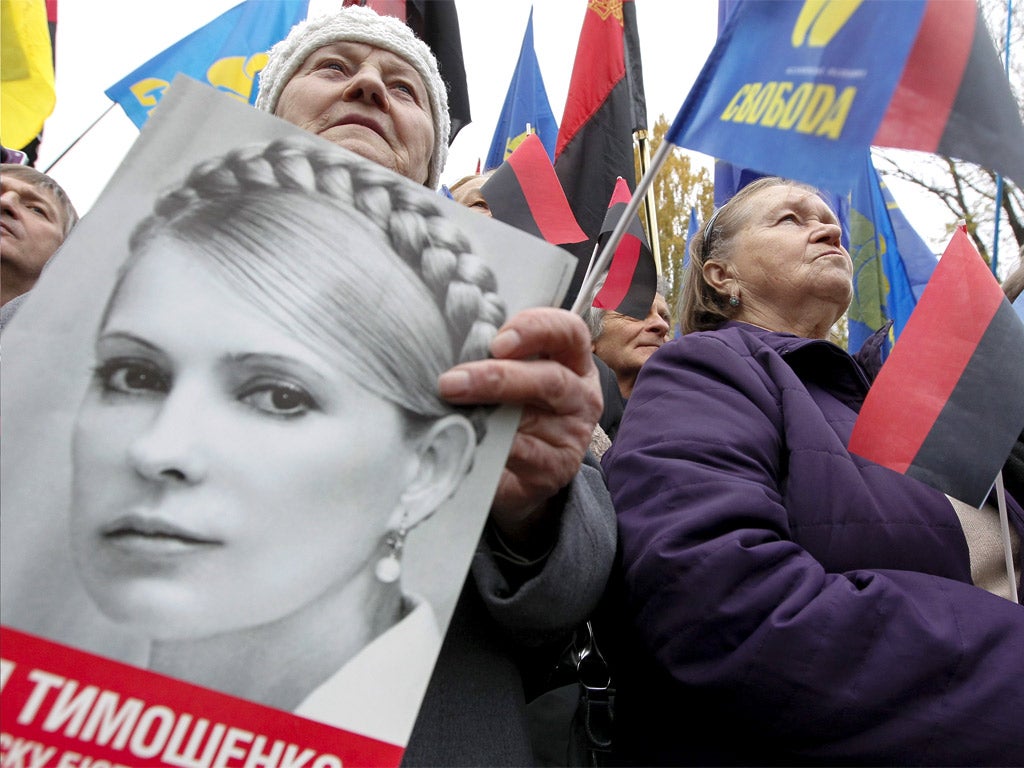Ukraine's planned release of political prisoner Yulia Tymoshenko and trade agreement with EU hindered by Russia’s chocolate strategy
Georgia, Moldova, Armenia and Ukraine were expected to sign historic agreements in Lithuania later this month as a first step to eventual EU membership - but Russian tactics may put a stop to this
Your support helps us to tell the story
From reproductive rights to climate change to Big Tech, The Independent is on the ground when the story is developing. Whether it's investigating the financials of Elon Musk's pro-Trump PAC or producing our latest documentary, 'The A Word', which shines a light on the American women fighting for reproductive rights, we know how important it is to parse out the facts from the messaging.
At such a critical moment in US history, we need reporters on the ground. Your donation allows us to keep sending journalists to speak to both sides of the story.
The Independent is trusted by Americans across the entire political spectrum. And unlike many other quality news outlets, we choose not to lock Americans out of our reporting and analysis with paywalls. We believe quality journalism should be available to everyone, paid for by those who can afford it.
Your support makes all the difference.This was meant to be the week when Ukraine turned a corner: its parliament was expected to approve a face-saving deal to free the detained former prime minister, Yulia Tymoshenko, to meet conditions for a historic trade and political agreement with the EU – a step taking the former Soviet state closer to the West, and away from the shadow of Russia.
Its parliament is due to hold a special session on Wednesday to vote on a law that would free Ms Tymoshenko – allowing European officials to ready the paperwork for the signing of the agreement in Vilnius at the end of the month. But the outlook is not rosy.
The week began with Ms Tymoshenko’s lawyer, Serhiy Vlasenko, being questioned over domestic violence allegations. Ms Tymoshenko claimed the move was politically motivated and said President Viktor Yanukovych was “kicking the association agreement to death”. It also emerged that Mr Yanukovych had travelled to Moscow for talks with President Vladimir Putin, prompting speculation that Ukraine could have changed its mind.
There has been a marked turnaround from the optimism at the start of the year, when Georgia, Moldova, Armenia and Ukraine were expected to sign historic agreements in Lithuania on 28/29 November, which would open up trade and be the first step to eventual EU membership bids.
Russia was ready with a carrot and stick to try to keep them under its influence. Imports of some Ukrainian chocolates and Moldovan wine – both significant exports for those countries – were banned. The threat of a disruption of vital gas supplies also hangs over Russia’s former territories.
Armenia was the first to jump ship, announcing in September that it was going to sign up to Russia’s customs union instead. Both Georgia and Moldova have for years aimed at greater integration with the EU and are weathering Russia’s tit-for-tat retaliatory measures. It is Ukraine, however, which has the greatest clout, with its population of 46 million people and $340bn economy.
The EU has shown readiness to counter Russia’s hard-ball tactics, responding to Moscow’s ban on Moldovan wine by immediately opening up EU markets. But the bloc has not yet shown willingness to budge on its demand that Ms Tymoshenko be freed. She was jailed for seven years in 2011 for abuse of office, a sentence she claims was aimed at preventing her challenging Mr Yanukovych in the 2015 presidential elections
“We are still determined to sign the agreement in Vilnius provided that Ukraine delivers what is expected from the member states,” an EU official told The Independent.

Amanda Paul, at the European Policy Centre think tank, said Mr Yanukovych could be engaged in a show of political strength. “It’s about Ukraine being predictably unpredictable, but I don’t think it reflects a change in their course towards the EU,” she said.
All eyes will be on the Ukrainian parliament on Wednesday. In the evening, EU negotiators will present their findings from an 18-month mission to assess Ukraine’s progress on “selective justice”, another condition for agreement. There is little sign, however, that Mr Yanukovych’s allies were softening their tone.
“If we don’t sign [the agreement] with the EU, it will be bad,” Oleksandr Yefremov, of Mr Yanukovych’s Party of Regions, was quoted by Reuters as saying. “But it won’t be the end of the world. The sun won’t stop coming up... at least we’ll have our self-respect.”
Join our commenting forum
Join thought-provoking conversations, follow other Independent readers and see their replies
0Comments